15 Jan 2015 | Azerbaijan, Azerbaijan News, Europe and Central Asia, News and features
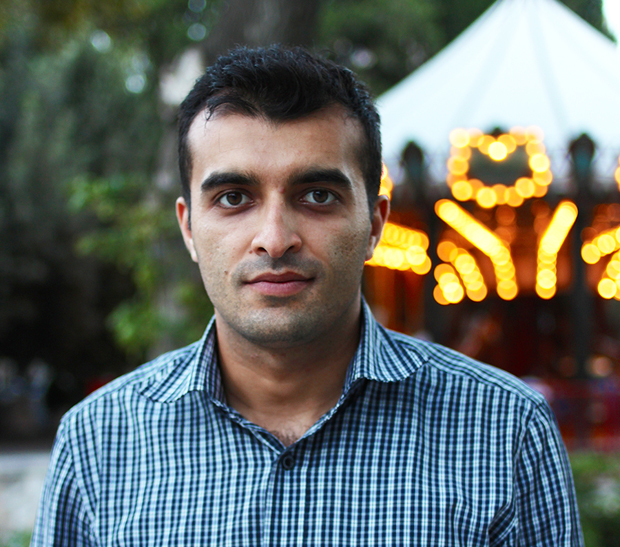
Rasul Jafarov in September 2013 (Photo: Melody Patry)
Locked in a double iron cage in a packed courtroom, Azerbaijani activist and regime critic Rasul Jafarov saw his trial open on Thursday.
Detained since 2 August, Jafarov stands accused of crimes including tax evasion, illegal entrepreneurship, abuse of office and forgery. The charges are widely believed to be trumped up and in connection to his human rights campaigning works. He could be sentenced to up to 12 years in prison.
Citing a lack of evidence of guilt, Jafarov’s lawyers requested the case be dropped, reported contact.az. They also asked, among other things, that he be allowed to sit with them. Both requests were denied.
The case against Jafarov is part of an ongoing onslaught against critical civil society by Azerbaijani authorities. Campaigners Leyla and Arif Yunus and lawyer Intigam Aliyev were all arrested around the same time as Jafarov, and remain in detention. Investigative journalist Khadija Ismayilova, who has reported on official corruption, was detained on 5 December 2014. Journalist Seymur Hazi, who has worked for Index journalism award winning Azadliq newspaper, is also in detention. There are currently more than 90 reported political prisoners in Azerbaijan.
In a recent development, authorities raided the Azerbaijan bureau of the US-funded Radio Free Europe/Radio Liberty.
Jafarov, 30, is chairman of the organisation Human Rights Club, and one of Azerbaijan’s most prominent human rights activists. When capital Baku hosted the Eurovision Song Contest in 2012, he organised the Sing for Democracy campaign to draw attention to rights abuses by President Ilham Aliyev’s government. Aliyev has been in power since 2003, succeeding his father Heydar. In 2013 he was re-elected for a third term, amid claims of voting fraud.
Jafarov was also planning on staging a Sport for Rights campaign when the inaugural European Olympics come to Baku this summer.
In August, he wrote an appeal to the international community from jail, saying that “the past 2-3 years everyone was asking half-joking, half-serious, when I was going to be arrested. It happened, and now I’m looking forward to your support!”
“As we focus on threats to free expression in countries like France in the wake of the attacks on Charlie Hebdo, it is vital that we remember the plight of the thousands of individuals worldwide facing daily harassment, threats of violence, and detention, for exercising their rights to free speak freely,” said Index CEO Jodie Ginsberg.
“Azerbaijan is one of the world’s worst countries for free speech. We call on the Azerbaijan government to release Rasul, and others detained for attempting to speak out about the country’s deplorable human rights record. We also urge other governments – who have professed so volubly in recent days their believe in the importance of free speech — to join our call for Rasul’s release.”
“The arrest of Rasul Jafarov, along with other main human rights defenders in Azerbaijan, such as Intigam Aliyev, Leyla Yunus, Anar Mammadli or journalist Khadija Ismayil, shows how the authorities handle critics: there is no space for dialogue in society but enough space for repression and imprisonment,” Florian Irminger, head of advocacy at the Human Rights House Foundation, said.
This article was posted on 15 January 2015 at indexoncensorship.org
9 Dec 2014 | Azerbaijan, Azerbaijan News, Magazine, News and features, Volume 43.04 Winter 2014

Campaigners outside the Baku court where members of N!DA were being sentenced (Photo: © Jahangir Yusif)
Azerbaijani activists Rasul Jafarov and Rebecca Vincent wrote an article for Index on Censorship magazine in December 2013 covering attacks on photojournalists, featured alongside a photo essay by photographers. A year later, the magazine asked Vincent to return to the issue, and cover how the past year has meant increasing risks for photographers, journalists and activists. One of the original photographers Jahangir Yusif returns to Index to illustrate the story. Jafarov is currently detained by the government, awaiting trial. Below, is a preview of the article to be featured in the next issue of the magazine.
Azerbaijani human rights defender Rasul Jafarov and I co-authored a piece for Index on Censorship magazine on behalf of the Art for Democracy campaign, focusing on the pressure faced by Azerbaijani photographers who covered risky topics such as corruption and human rights abuses. The piece ran alongside a photo story by some of the country’s most talented independent photographers.
That piece was typical of the work of the Art for Democracy campaign, which used all forms of artistic expression to promote democracy and human rights in Azerbaijan. Now, a year later, the human rights situation in Azerbaijan has worsened immeasurably. Rasul Jafarov was arrested and remains in detention, facing a serious jail sentence on fabricated and politically motivated charges, alongside a number of other prominent human rights defenders. Art for Democracy’s activities have been effectively suspended, as well as the operations of nearly all of the remaining human rights NGOs in the country.
Indeed, the past year has seen the most unprecedented of all human rights crackdowns to date in Azerbaijan, as the authorities work aggressively to silence the country’s few remaining voices. As a result, there are currently more than 90 reported political prisoners in Azerbaijan, including some of the country’s leading human rights defenders, lawyers, journalists, and bloggers.

Police and activists clash during the run-up to the presidential election (Photo: © Jahangir Yusif)
Rasul Jafarov’s case bears all the hallmarks of the pressure exerted on human rights defenders in Azerbaijan. He had been on the authorities’ radar for years, with his earlier work for the Institute for Reporters’ Freedom and Safety and, since December 2010, in his role as the founder and Chairman of the Human Rights Club. Perhaps most notably, Jafarov co-ordinated the Sing for Democracy campaign, which used the May 2012 Eurovision Song Contest, held in the capital Baku, as a platform to expose on-going human rights violations in the country and promote democratic change. He was the driving force behind the creation of the Art for Democracy campaign.
Alongside Art for Democracy’s activities, Jafarov worked to expose the situation of political prisoners. On the eve of the October 2013 presidential election the Human Rights Club released a list Jafarov had compiled of political prisoners, revealing a shocking 144 cases. The election itself was marred by widespread electoral fraud and saw incumbent President Ilham Aliyev re-elected for a third term in office.
In 2014, Jafarov continued working on the list and coordinating efforts among NGOs to achieve consensus and develop a joint version of the list, which would prove crucial to international advocacy efforts. Along with some of the other human rights defenders who have since been targeted, Jafarov repeatedly raised the issue at the Council of Europe, and advocated the appointment of a new special rapporteur to take up the work of a previous rapporteur whose efforts were defeated by lobbying from the Azerbaijani government. Jafarov also announced plans to launch a new campaign, Sports for Rights, ahead of the first European Games, which are due to be held in Baku in June 2015.
As a result of these activities, Jafarov faced a number of pressures from the authorities, but he persevered. He was aware of the risks, but also remained hopeful that the situation in his country would improve. He was dedicated to his work defending the rights of others and attempting to hold his government to account. Indeed he remains passionately committed to these aims even now, in detention.
After having his bank account frozen and being prevented from travelling outside of the country, Jafarov was arrested on 2 August and charged with illegal entrepreneurship, abuse of office, and tax evasion. The fabricated and politically motivated charges were similar to those used against other prominent human rights defenders. Some of the charges were linked to the fact that the Human Rights Club remained unregistered, despite the fact that Jafarov had been attempting to register the NGO with the state for more than three years, an issue pending consideration by the European Court of Human Rights. Jafarov remains held at the Kurdekhani detention centre, awaiting trial.
Jafarov is only one of many prominent human rights defenders to have been targeted in Azerbaijan in recent months. On 26 May, the chairman of the Election Monitoring and Democracy Studies Centre Anar Mammadli, was sentenced to five and a half years in jail, and his colleague Bashir Suleymanli to three and a half years on charges including illegal entrepreneurship, abuse of office, and tax evasion. Elnur Mammadov of the International Cooperation of Volunteers’ Union was also sentenced to two years on probation.

Protesters campaign for the release of imprisoned activists (Photo: © Jahangir Yusif)
On 30 July, the head of the Institute for Peace and Democracy, Leyla Yunus, was arrested on politically motivated charges of treason, fraud, forgery, tax evasion, and abuse of office. Her husband, an activist in his own right, Arif Yunus, was arrested on 5 August on charges of treason and fraud. On 8 August, the head of the Legal Education Society Intigam Aliyev was arrested on similar politically motivated charges: illegal entrepreneurship, abuse of office, and tax evasion. There are now a total of nine human rights defenders behind bars in Azerbaijan. In addition, the whereabouts of the director of the Institute for Reporters’ Freedom and Safety Emin Huseynov have been unknown since 8 August, the day his organisation’s office was searched and sealed shut by police.
Parallel to these arrests, the authorities have stepped up other forms of pressure against both local and foreign NGOs, making it nearly impossible for organisations working on issues related to human rights and democracy to continue operating in the country. This has resulted in the closure or suspension of activities of many of the remaining human rights NGOs in the country. Parliament continues to tighten legislation related to the operations and financing of NGOs, cutting off vital sources of funding for independent groups and making it difficult to carry out even routine activities.
At the same time, other violations continue, such as pressure against the few remaining opposition and independent media outlets in the country. Prominent investigative journalist Khadija Ismayilova was arrested on 5 December, as government officials and their supporters employed new tactics in their relentless attempts to silence her. Journalists Seymur Khaziyev and Khalid Garayev, both presenters of the Azerbaijan Hour programme, were arrested on 29 August and 29 October respectively, bringing the current total of journalists and bloggers behind bars to 15. The Azadliq newspaper, the country’s main opposition daily newspaper, teeters on the brink of closure, facing serious financial hardship because of excessive fines from civil defamation lawsuits and a number of other pressures from the authorities.
In an ironic twist of fate, in the midst of this unprecedented crackdown, Azerbaijan in May 2014 assumed the chairmanship of Council of Europe, a body whose very purpose is to safeguard human rights and democratic values. Sadly, during Azerbaijan’s chairmanship, the Council of Europe, and, the broader international community, has done little to hold the government to account for its human rights obligations.
Now, with Jafarov and so many of his colleagues behind bars and the organisations they represent effectively paralysed, concrete international support is needed more than ever. Azerbaijan’s few remaining independent voices are under siege and will not be able to hold out much longer.
©Rebecca Vincent
www.indexoncensorship.org
Rebecca Vincent is a human rights activist and former diplomat who writes regularly on human rights issues in Azerbaijan. She served as advocacy director of the Art for Democracy campaign until April 2014
Jahangir Yusif is a photo-journalist whose work was featured in the original article 12 months ago, read the original article here.
Index recently was part of a protest at the Azerbaijani embassy, read more about it here.
This article is from the upcoming winter edition of Index on Censorship magazine. Subscribe to Index on Censorship magazine by Dec 31, 2014 for 25% off a print subscription.
This article was posted on 9 December 2014 and appears in print as Azeri attack in the Winter 2014 Index on Censorship magazine.
5 Dec 2014 | Azerbaijan, Azerbaijan News, News and features

Khadija Ismayilova
The arrest of Azerbaijani investigative journalist Khadija Ismayilova today underscores the entrenched authoritarian instincts of the government of President Ilham Aliyev. Ismayilova was sentenced to a two month pretrial detention.
“The arrest of Khadija Ismayilova is part of Azerbaijan’s continued crackdown on free media and civil society. This confirms the pattern of intimidation and harassment perpetrated by authorities in an attempt to silence critical voices,” Melody Patry, senior advocacy officer at Index on Censorship, said.
Ismayilova’s arrest follows the earlier detentions of human rights defenders Leyla Yunus and her husband Arif Yunus; free speech advocate Rasul Jafarov; journalists Seymur Hezi, Parviz Hashimli, Nijat Aliyev and Sardar Alibeyli; and bloggers Omar Mamedov, Abdul Abilov and Rashad Ramazano. The country has starved the 2014 Index award winning Azadliq newspaper of resources, forcing it to suspend its print edition. The charges against all of the detainees range from hooliganism to illegal storage and sale of drugs.
Today’s action by Azerbaijan’s authorities also drew immediate criticism from Human Rights House Foundation Executive Director Maria Dahle and the OSCE Representative on Freedom of the Media Dunja Mijatović.
“This sentence does not come as a surprise: we assumed the authorities wanted to silence Khadija Ismayilova,” said Dahle. “The arrest has a chilling effect: one must now consider that every independent civil society leader in Azerbaijan is a target and can be arrested at any given time for any charge, as ludicrous as one can imagine. The international community, especially the Council of Europe, must now get a foot in the door to stop the repression, including by stopping further cooperation with Azerbaijan’s authorities”, Dahle added.
“The arrest of Ismayilova is nothing but orchestrated intimidation, which is a part of the ongoing campaign aimed at silencing her free and critical voice,” Mijatović said.
On Friday afternoon, Ismayilova’s usually very active Facebook page was also inaccessible.
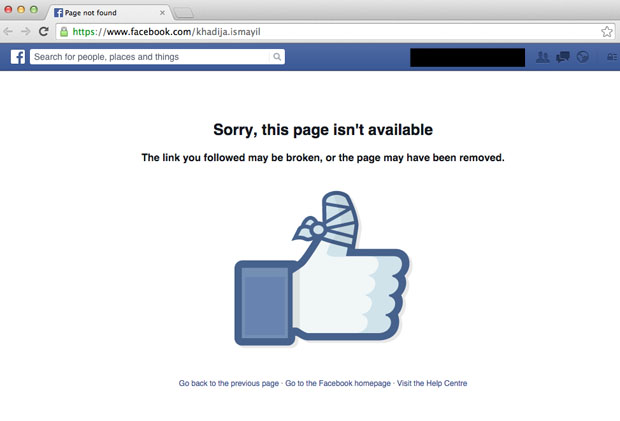
Azerbaijan, which spends significant amounts on media relations, presents itself as a modern nation. But behind the smokescreen, the country has been carrying out a systematic suppression of civil society, journalists and independent media.
This article was posted on 5 Dec 2014 at indexoncensorship.org
21 Nov 2014 | Azerbaijan News, News and features, Politics and Society
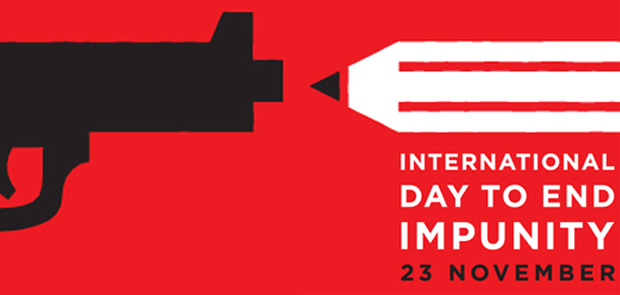
Impunity is a festering sore on freedom of the press. Harassment, violence and murder of journalists are problems around the world — even in Europe, as Index’s project mapping media violations has shown. The numbers speak for themselves: of the 370 media workers murdered in connection with their job over the past ten years, 90% have been murdered without their killers being punished. Many of these crimes aren’t even investigated.
Ahead of the International Day to End Impunity, journalists from across the world told Index why impunity is such a danger to free expression and a free press.
Kostas Vaxevanis, Greek investigative journalist, HOT DOC, and 2013 Index award winner
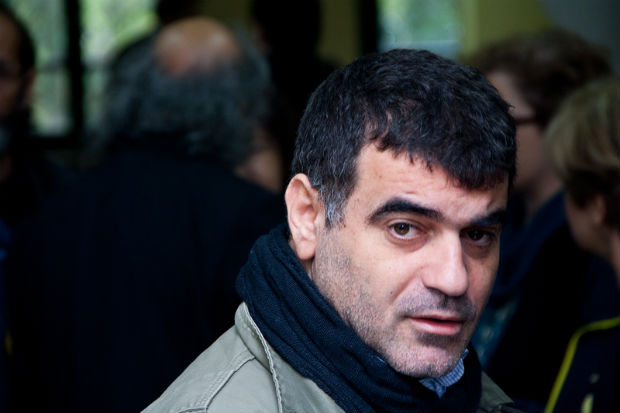
Impunity generates corruption and its enemy is the one thing that exposes and threatens it: the freedom of the press.
The HOT DOC is currently facing 40 lawsuits mainly from ministers and politicians in an attempt to shut us down as journalists. We reveal scandals like one with the minister of justice, a former judge who committed an “error” that granted amnesty to officials who had abused public funds, and instead of answering in public as required as politicians, we are being sued. We pester the courts and despite winning lawsuits, we need more than 80,000 euro per year for court expenses.
Heather Brooke, British-American journalist and 2010 Index award winner

It is a problem that journalists around the world get threatened, intimidated and killed just for doing their job.
These crimes, like any other crime, need to be investigated. If not, it sends a message that this is okay; that the law is only for certain people. It is an implicit acceptance of this behaviour.
If we want to have a strong press, threats, intimidation and murder of journalists can’t be seen to be implicitly condoned by the state. It’s a dangerous message. It makes people frightened to ask tough questions, and if that happens, you are on the way to shutting down a robust press.
Kareem Amer, Egyptian blogger and 2007 Index award winner
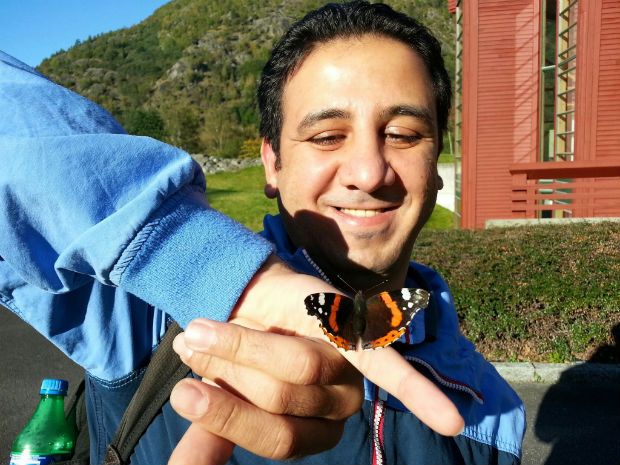
I come from a country where we have a lack of justice. The executive power controls the parliament and the justice system. People feel that if they get mistreated or oppressed by those in power nothing will protect them or bring them justice.
Not only people who express their opinions suffer from a lack of justice. People from different backgrounds who have a different way of thinking and different interests also don’t trust the justice system. Those who have more power can easily avoid punishment and take revenge against victims who tried to get their rights through judiciary system.
Officially, police officers don’t have any kind of formal immunity. According to the law they can be questioned if they violate the rights of people by torturing or murdering. But, in fact, all those accused of killing protesters and torturing prisoners managed to avoid being punished, with a few exceptions.
I feel that it’s not safe to express your opinions freely in a country where people can easily avoid punishment.
I have been sentenced to four years in jail for writing two articles and publishing them on the internet, and during that time I have been through physical violence and mistreatment committed by security forces. I reported it but no one has been questioned or punished. That made me feel that there is no justice in my country and that it is easy to be humiliated and tortured and you will not get protected, since the judiciary system is practically part of the executive power and the judges do what the authorities want them to do.
Rahim Haciyev, Azerbajiani journalist and acting editor of 2014 Index award winner Azadliq

Rahim Haciyev, deputy editor-in-chief of Azerbaijani newspaper Azadliq (Photo: Alex Brenner for Index on Censorship)
Freedom of expression is the basis of all other rights and freedoms. Free speech is something all authoritarian regimes are worried about as it threatens their existence. That is why freedom of expression is specifically targeted by authoritarian regimes. If there are no free people, there is no freedom of expression. Free speech is a precondition for journalists to be able to work in full strength and thus fulfill their functions in society. Authoritarian regimes organise permanent attacks on journalists with impunity. A free journalist armed with freedom of expression is a threat to an authoritarian regime, this is why perpetrators receive awards, not punishment for oppressing journalists’ rights. This process leads to self-censorship, and journalists stop being carriers of truthful information, which in the end affects society.
Nazeeha Saeed, award-winning Bahraini journalist, who was tortured in police custody
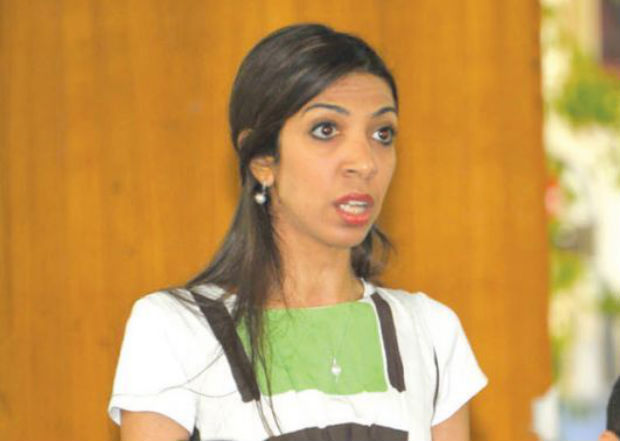
Impunity is a threat to free expression because journalists and people who report the facts on the ground will feel danger, and if no one gets punished for crimes against journalists or others it establishes a systematic impunity culture. Feeling insecure is something bad, it stops people from having a normal life, functioning and expressing themselves.
Endalk Chala, Ethiopian blogger and co-founder of the Zone9 blogging collective (of which six members are currently imprisoned for their writing)
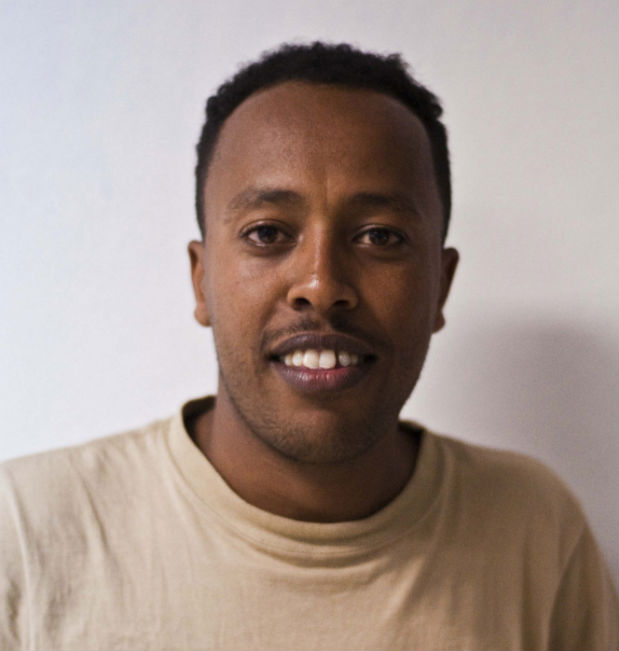
Impunity is a threat for free expression on many levels. In my experience I have seen impunity when it cultivates self-censorship. Let’s take the case of Zone9 bloggers. Since their arrest there are a lot of people who tried to visit them in prison, take a picture of them, attend their trial and tweet about their hearings but all of these have invited very bad reactions from the Ethiopian police.
Some were arrested briefly, others were beaten and it has become impossible to attend the “trial” of the bloggers and journalists. No action was taken by the Ethiopian courts against the bad actions of the police even though the bloggers have contentiously reported the kinds of harassment. As a result, people have stopped tweeting, taking pictures and writing about the bloggers. Apparently, the volume of the tweets and Facebook status updates which comes from Ethiopia has dwindled significantly. People don’t want to risk harassment because of a single tweet or a picture. This self-censorship could be attributed to impunity, which is pervasive in Ethiopia.
Impunity also causes a lack of trust in the Ethiopian judicial system. I don’t trust the independence of the Ethiopian justice system. I have never seen a police man/woman or a government authority being prosecuted for their bad actions against journalists. The Ethiopian government has been prosecuting hundreds of journalists for criminal defamation, terrorism and inciting violence but not a single government person for violating journalists’ rights. This tells you a lot about the compromised justice system of the country.
Andrei Soldatov, Russian investigative journalist and co-founder and editor of Agentura.Ru

Russia is known for its traditions of self-censorship. Despite what the laws say, the rules are explained in a quiet voice in some unmarked cabinets. Sometimes the rules are even not explained, and journalists, editors and owners of media have to constantly guess what is allowed at that moment. Not everyone is allowed to ask directly, so we are all in the game about signals sent by the authorities.
Journalists are beaten and killed in Russia, and this provides plenty of room to send such signals to the journalistic community. You don’t need to explain that investigative reporting in the North Caucasus is not allowed anymore: you just need to turn the investigation of Anna Politkovskaya’s assassination in 2006 into a show trial, where the assassins are duly found guilty, but the question of masterminds is never answered. You could be sure, the signal would be taken correctly.
Fergal Keane, Irish journalist, BBC foreign correspondent and 2003 Index award winner
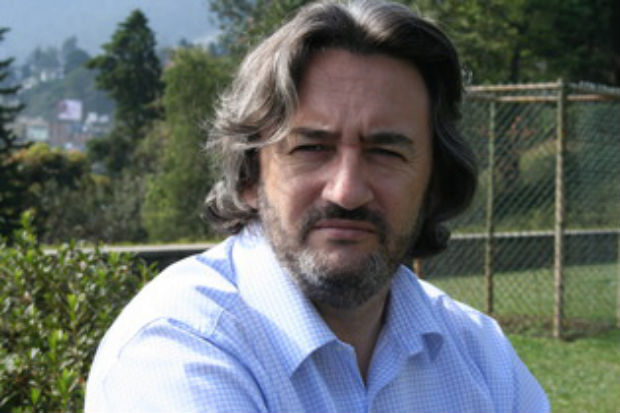
Impunity allows the enemies of free speech to threaten, torture and kill journalists secure in the knowledge they will never be called to account. I can’t think of a greater threat.
Veran Matic, B92 board of directors chairman and B92 news editor-in-chief
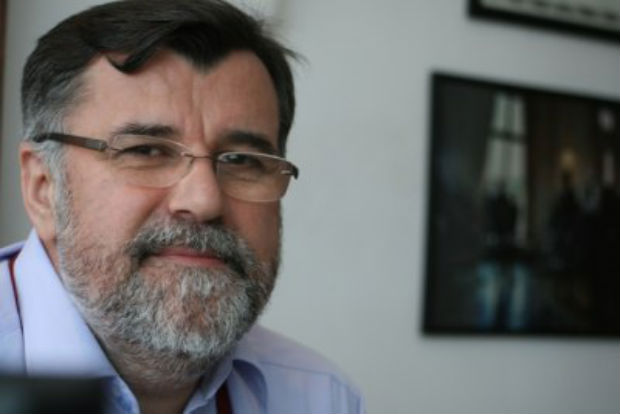
In my 25 years of experience in Serbia, I have been editor-in-chief of a media outlet that was banned on several occasions and I have been arrested.
Impunity directly encourages and expands violence towards journalists. The culture of producing fear is the most efficient form of censorship. One unsolved murder creates space for implementing the next one without any threat for the executioners. In the meantime, the media gets killed/eliminated in the process.
The lack of discontinuity with Slobodan Milosevic’s authoritarian regime had left room for impunity to remain intact.
Less than two years ago, I decided to make a kind of a breakthrough when it comes to impunity. I proposed the establishment of a mixed commission composed of journalists, members of the police and members of the security information agency. We managed to bring the 1999 murder of Slavko Curuvija to a phase where official indictment was brought, along with arrest of all suspects in this murder case. The 2001 murder of our colleague Milan Pantic is also in the final stage of investigation. A 1994 assassination — of Dada Vujasinovic — is being reviewed by the National Forensic Institute from The Hague because local institutions have compromised themselves in this case.
In the same way as impunity restricts freedom of speech, solving of these cases, at least 20 years later, will surely contribute to journalists being encouraged to do their job in the best possible way. Of course, I am not counting here on the new problems with which journalists and media face, and that call for finding new models of financing high quality journalism for the sake of public interest, worldwide.
The team behind Pao-Pao, a Chinese website focusing on internet freedom issues
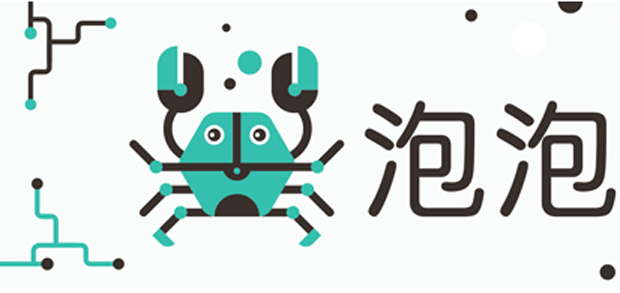
This year, we have seen a rising number of Chinese journalists, academics and human rights lawyers detained, threatened and arrested simply for speaking out online. While Chinese regulations on freedom of speech need to be closely examined, tech companies also play an important role in the deterioration of freedom of speech in China.
While Chinese tech companies are under the tight control of the Chinese authorities, there exists a culture of impunity in the western tech companies, especially when they are doing business in China. When we worked with our partner GreatFire to launch a FreeWeibo iOS application last year (an app to deliver uncensored content from Weibo, the largest social media platform in China), Apple decided to remove the app from their Chinese iTunes store. The only reason given was that Apple received a request from the Chinese authorities. This June, LinkedIn censored user posts deemed sensitive by the Chinese government on the global level, far beyond Beijing’s censorship requirement, even though LinkedIn does not have servers in China.
It would be the start of the end if these global tech companies start removing content simply because they do not want to upset their business relationships with China. It is crucial to hold these companies accountable for their behaviour. Otherwise it will further erode freedom of expression, not only for China, but also for the whole world.
The International Day to End Impunity was set up in 2011 by free speech network IFEX, of which Index on Censorship is a member, with the aim of demanding accountability and justice on behalf of those “targeted for exercising their right to freedom of expression”.
This article was originally posted on 21 November 2014 at indexoncensorship.org. It was updated at 14:09, 24 November to include the response from Pao-Pao.

















